Hello everyone! Welcome back to our deep dive series. This is the third article in the series. Previously, we compared NocoBase with two outstanding products:
NocoBase vs NocoDB: An In-Depth Comparison of Open Source No-Code Tools
Open Source CRUD Development Tools: NocoBase vs Refine
Today, let’s turn our attention to Appsmith.

Both NocoBase and Appsmith are open-source low-code/no-code development platforms with a shared goal: helping developers (and even non-technical users) quickly build applications, thereby reducing the reliance on traditional software development.
🙌 Have a try: NocoBase Tutorial – Task Management System
However, these products differ significantly in terms of features and use cases.
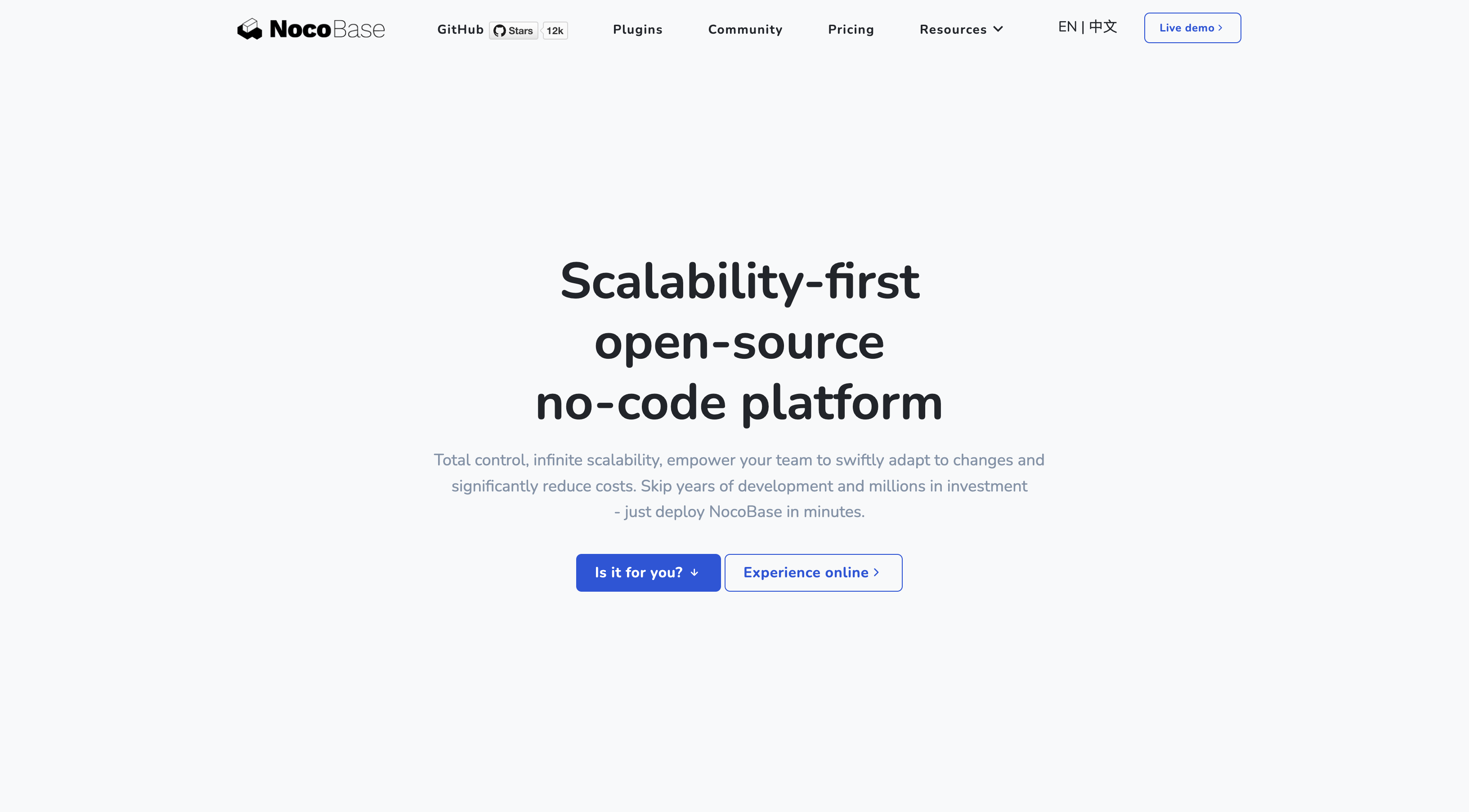
NocoBase is a data model-driven low-code/no-code development platform with strong data management capabilities and a flexible plugin architecture. Its plugin architecture allows users to extend functionalities as needed, making it suitable for complex business process management, data access control, and highly customized application scenarios.
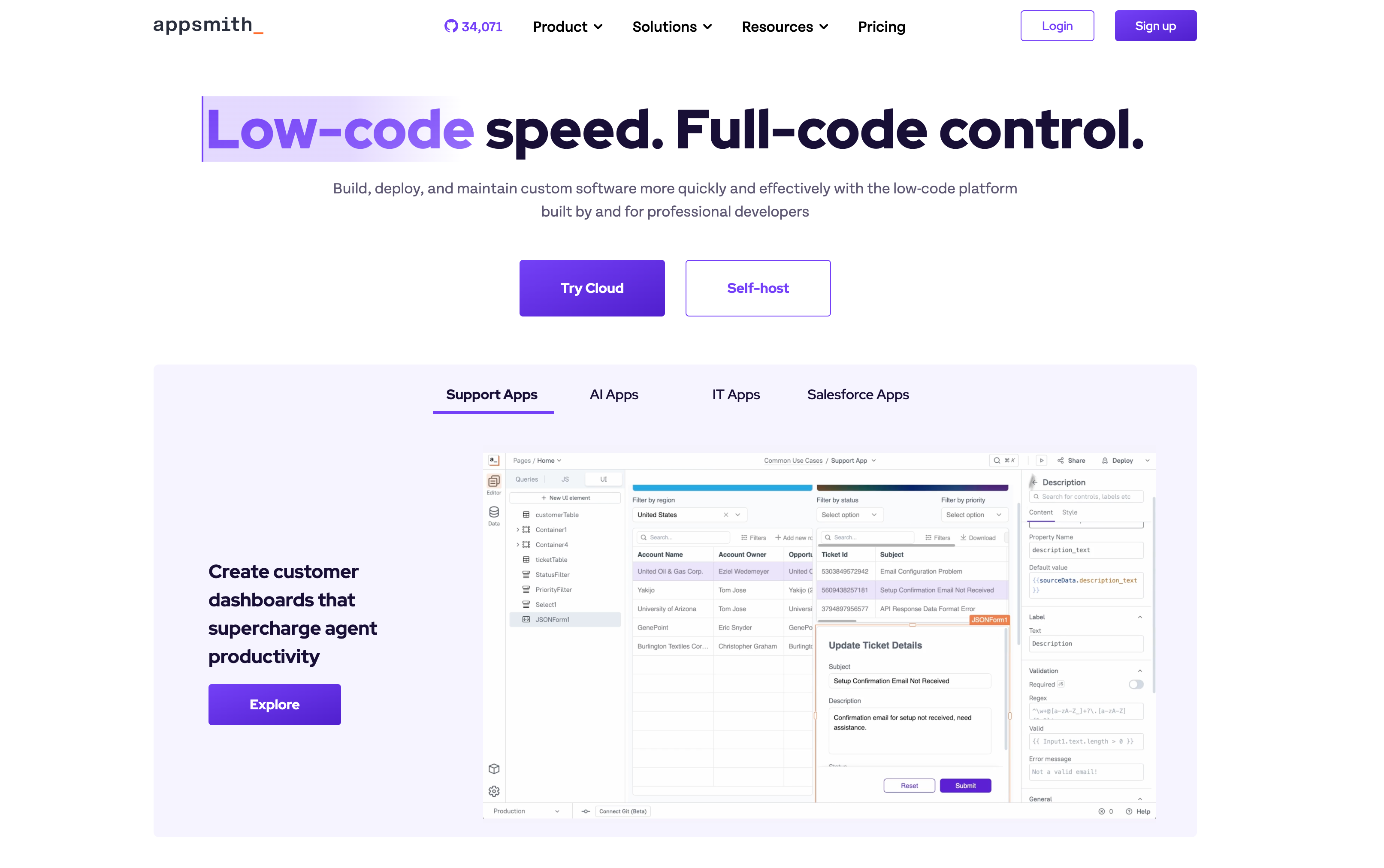
Appsmith, on the other hand, stands out for its intuitive user interface and extensive integration capabilities. It helps users quickly create dashboards, admin panels, or data-driven front-end interfaces. With a rich library of built-in components and drag-and-drop interface design, it simplifies the process of building interfaces, making it more suitable for projects requiring quick front-end development, data visualization, or integration with common data sources.
When choosing the right low-code/no-code platform, understanding the characteristics and differences of each tool is crucial for project success. In this article, we aim to provide a comprehensive understanding of the key features, advantages, and suitable use cases for both platforms, enabling readers to make informed decisions based on their specific needs.
💡 Read More: Top 15 Open-Source Low-Code Projects with the Most GitHub Stars
Next, we will compare NocoBase and Appsmith across several dimensions: data management, UI/UX design, integration capabilities, access control, workflow automation and deployment. This analysis will help you understand the best uses for each tool.
Special thanks to Hants Williams for the suggestions in our previous article. We have added a section on deployment comparison in this article.❤️
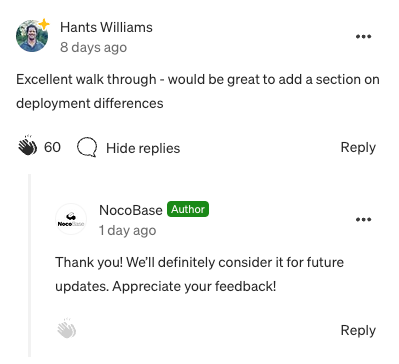
Data Management Capabilities
Data management is a fundamental function in application development, especially for applications that need to handle complex data structures and relationships. The strength of a platform’s data management capabilities directly impacts development efficiency and project maintainability.
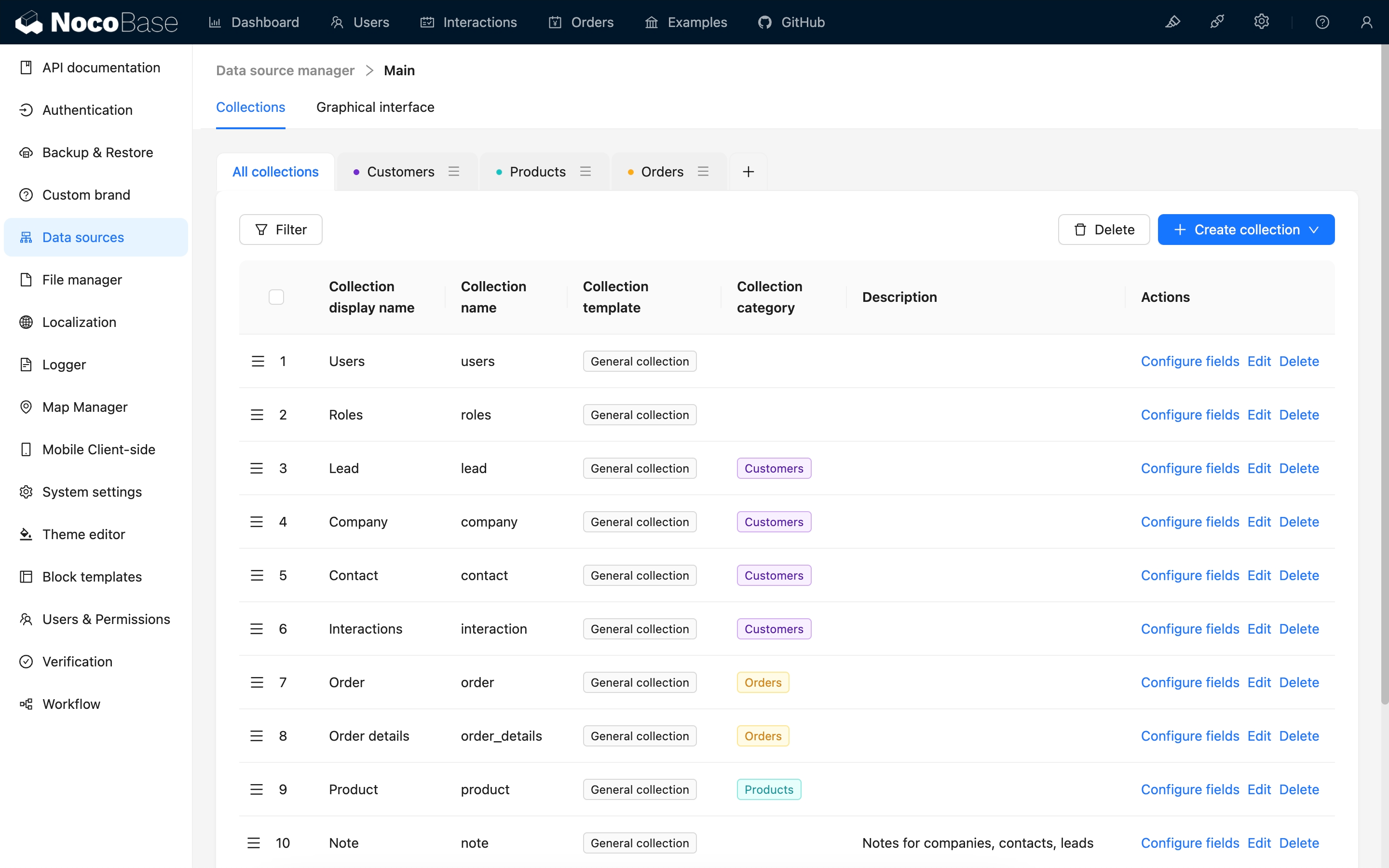
NocoBase is a data model-driven platform with powerful data management features, including:
- Data Model-Driven Design: NocoBase uses a data model-driven approach, where users can define the application’s basic structure by configuring data models. The data source management is a separate plugin, allowing for management of different data sources and tables. Supported data sources include NocoBase’s main database (with support for MySQL, PostgreSQL, SQLite), external MySQL, MariaDB, and PostgreSQL databases.
- Complex Data Relationships: NocoBase supports the modeling and management of complex data relationships, such as one-to-one, one-to-many, and many-to-many. Developers can establish relationships between tables and easily query or manipulate related data via the interface or API.
- Fine-Grained Access Control: NocoBase offers granular permission control, allowing for field-level and row-level data access settings. Developers can configure access permissions for different roles and user groups, ensuring data security and compliance.
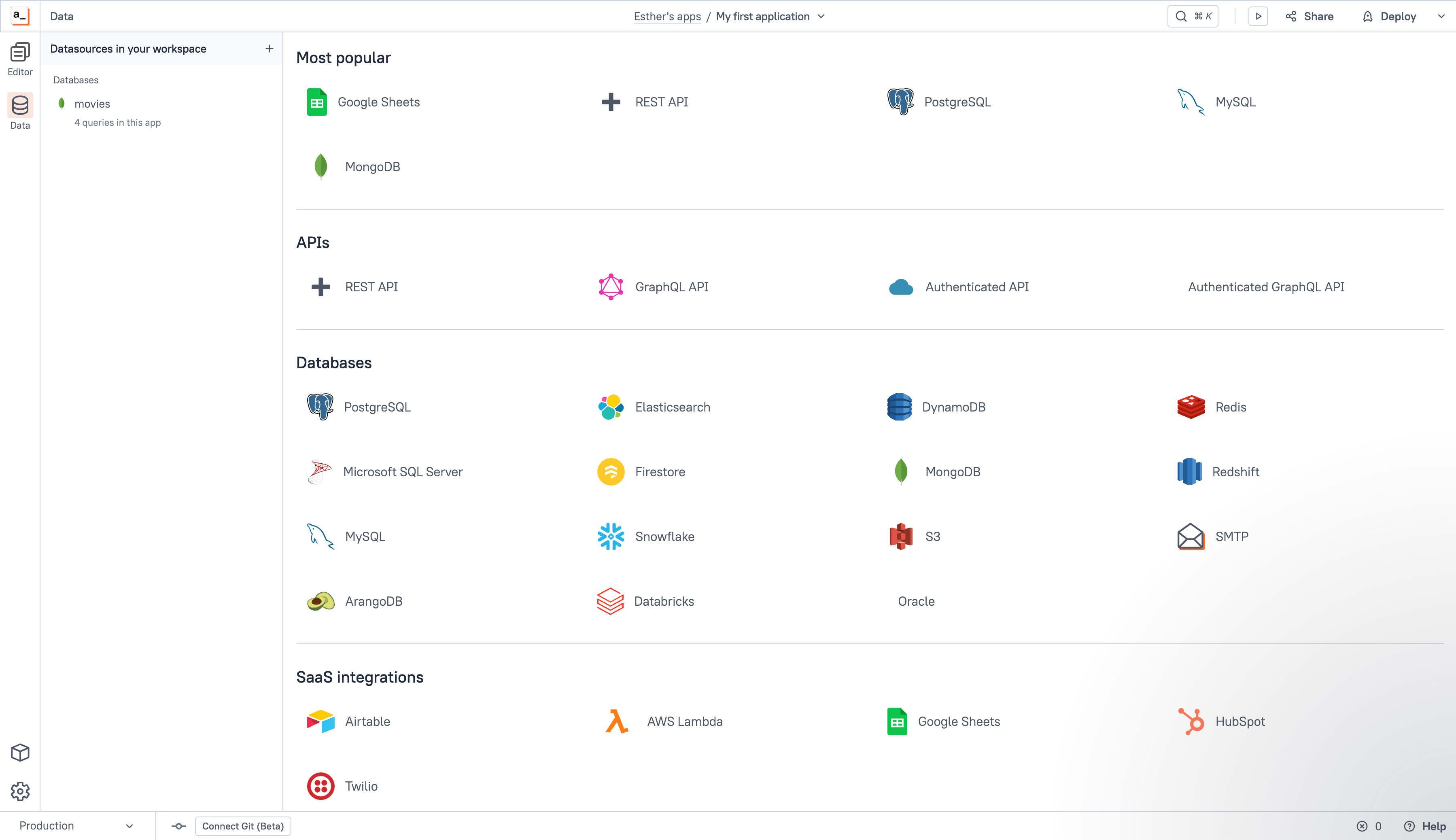
Appsmith mainly relies on its data integration capabilities, supporting connections to various data sources, such as databases (MySQL, PostgreSQL, MongoDB), REST APIs, and GraphQL.
- Multiple Data Source Integration: Appsmith allows developers to quickly integrate common data sources for data querying and display. Built-in connectors make it easy to connect to databases or third-party APIs, facilitating data interaction with minimal configuration. This approach is suitable for scenarios where complex data modeling is not required.
- Visual Configuration for Data Operations: Appsmith provides an intuitive visual interface for configuring data queries, filtering, pagination, and more. While this approach simplifies basic data operations, it may lack flexibility for handling complex business logic.
- Simplified Access Control: Appsmith’s access control is primarily at the page level and offers basic data access management. For complex permission structures or row-level control, custom logic or external services may be needed.
In summary, NocoBase is better suited for complex data modeling and fine-grained access control, while Appsmith excels in quickly integrating multiple data sources and simple data display.
💡 Read More: The Ultimate Guide to Data Transformation Tools
UI/UX Design Flexibility
Building an intuitive and efficient user interface is crucial for enhancing the user experience during application development.
NocoBase employs a WYSIWYG interface configuration mode. Click on the Interface Configuration button (orange section) in the upper right corner to switch between Configuration Mode and Usage Mode.
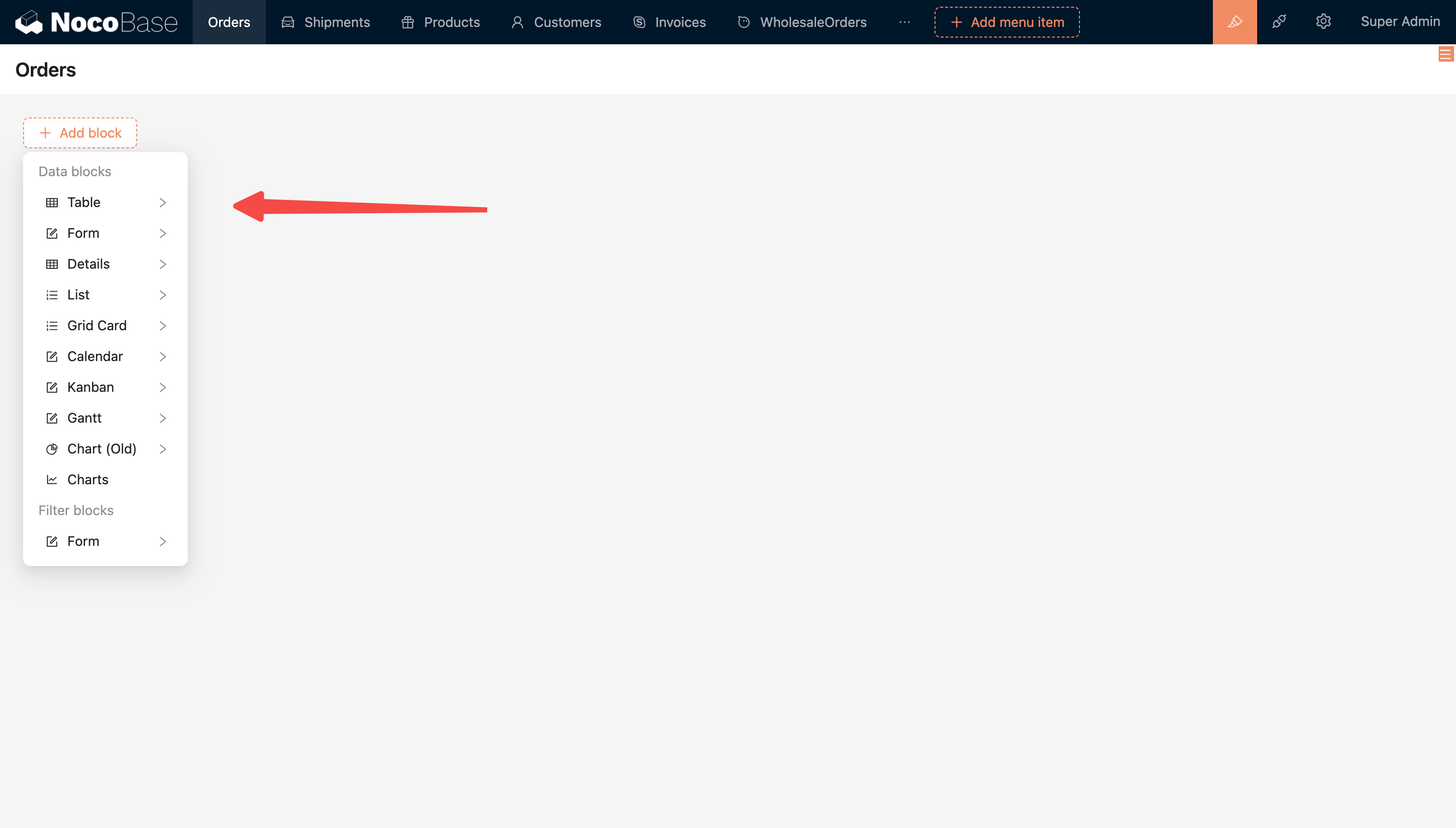
Frontend Blocks: NocoBase provides Notion-like frontend blocks for creating modular elements. Developers can use blocks (such as tables, forms, charts, kanban, etc.) to design the layout. Each block can be configured with specific data source bindings, visibility conditions, and user interactions.
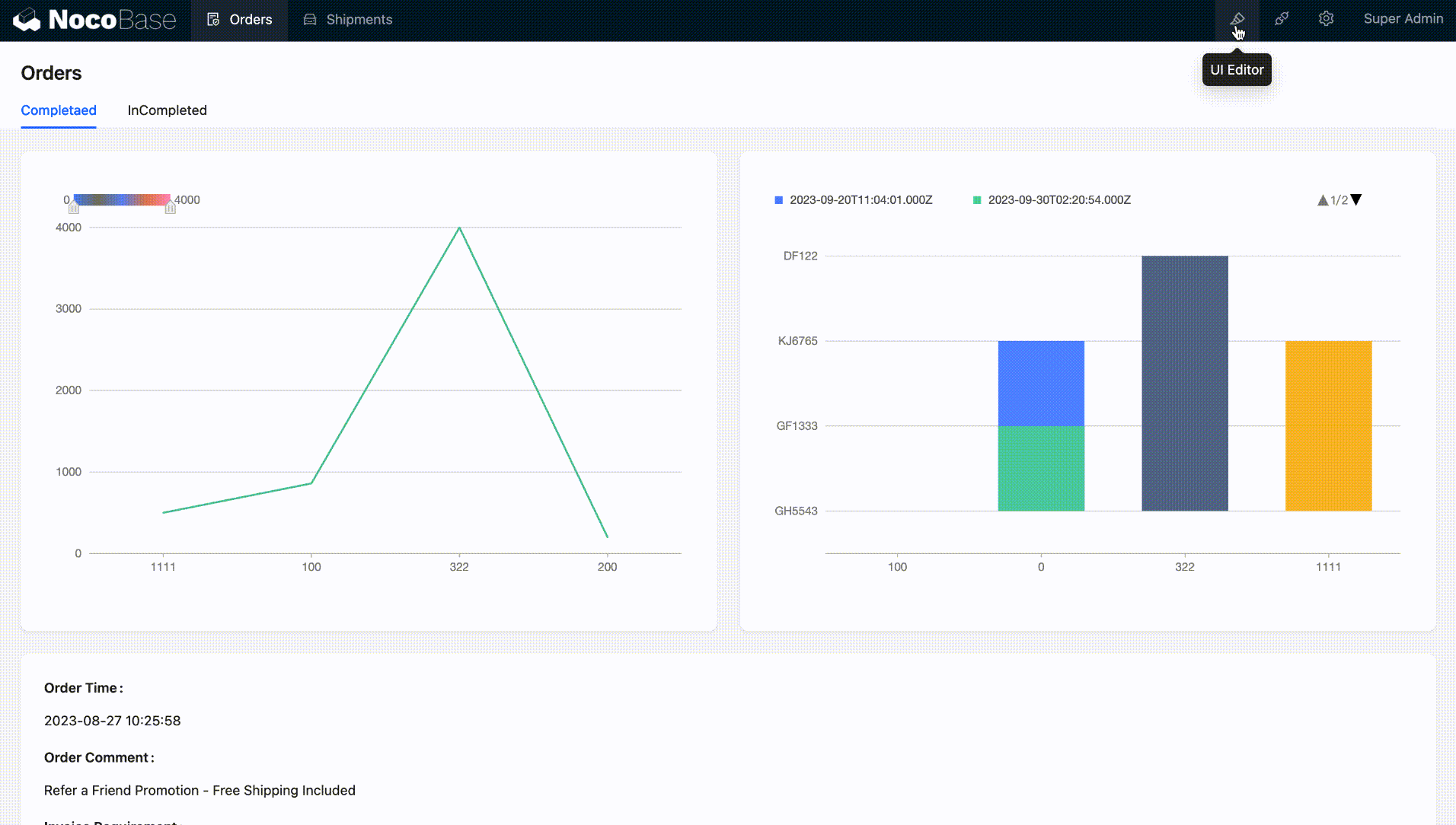
Dynamic Layout and Editor: The platform supports drag-and-drop operations for rearranging blocks, defining visibility, binding data sources, and configuring actions. This dynamic layout approach allows for creating interfaces suited for various complex scenarios, such as admin panels, dashboards, and business forms.
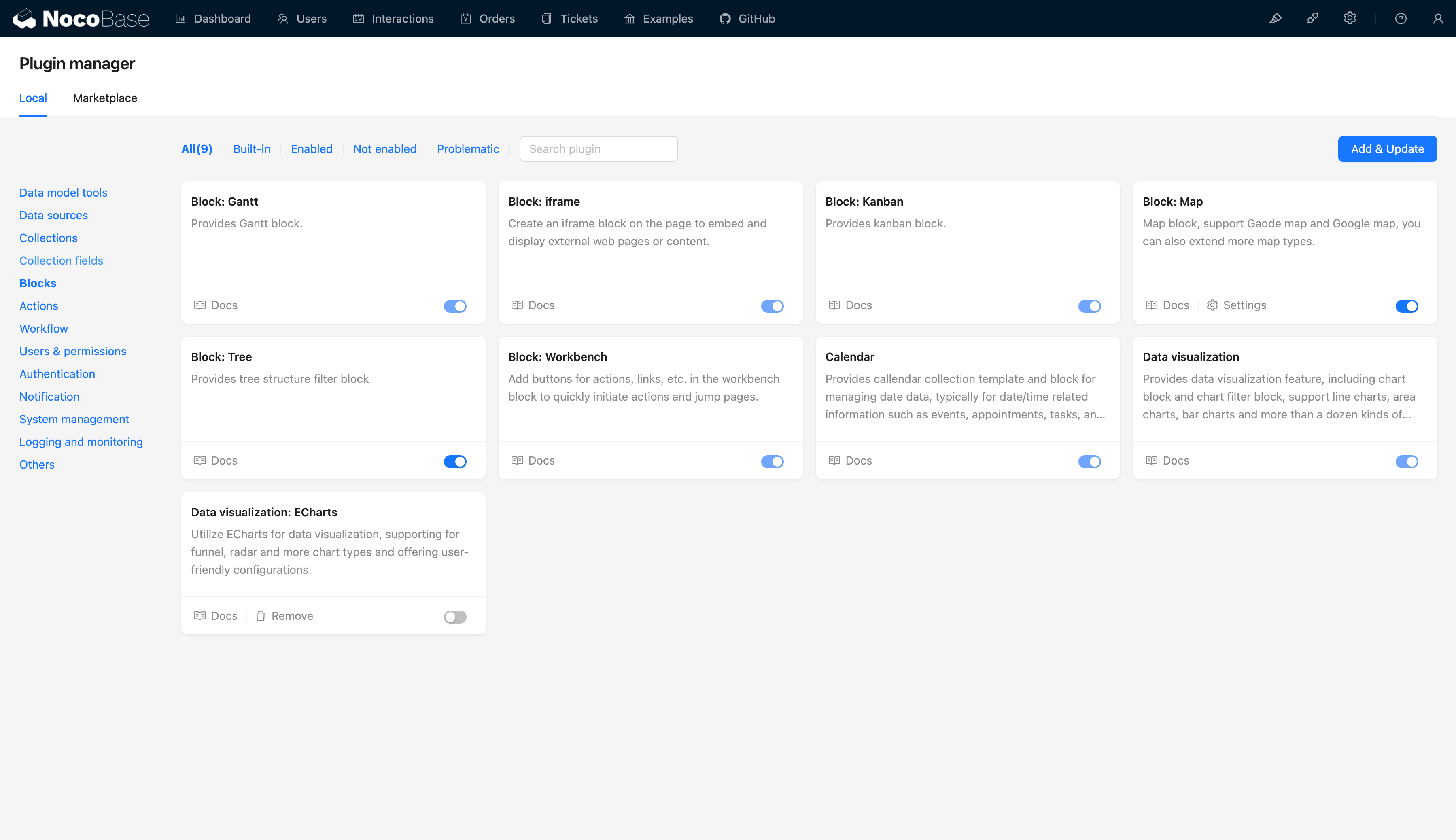
Rich Built-In Blocks and Extensibility: NocoBase’s editor supports extending functionalities through custom code or plugins, providing a level of freedom close to native front-end development.
Appsmith features drag-and-drop interface design and an extensive library of built-in components.
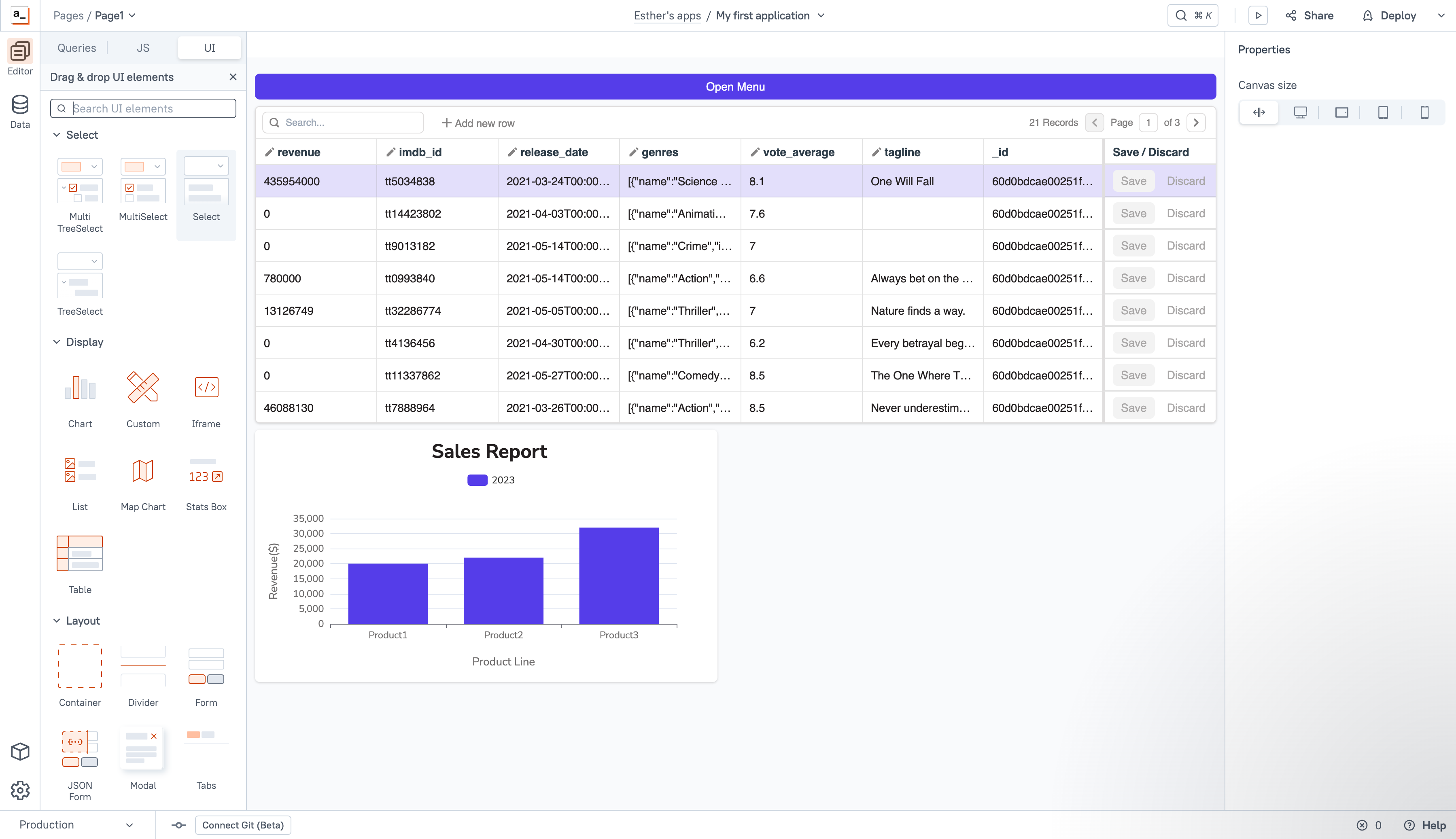
Drag-and-Drop Design: Allows for the quick creation of user interfaces by dragging components like tables, buttons, forms, and charts onto the design canvas.
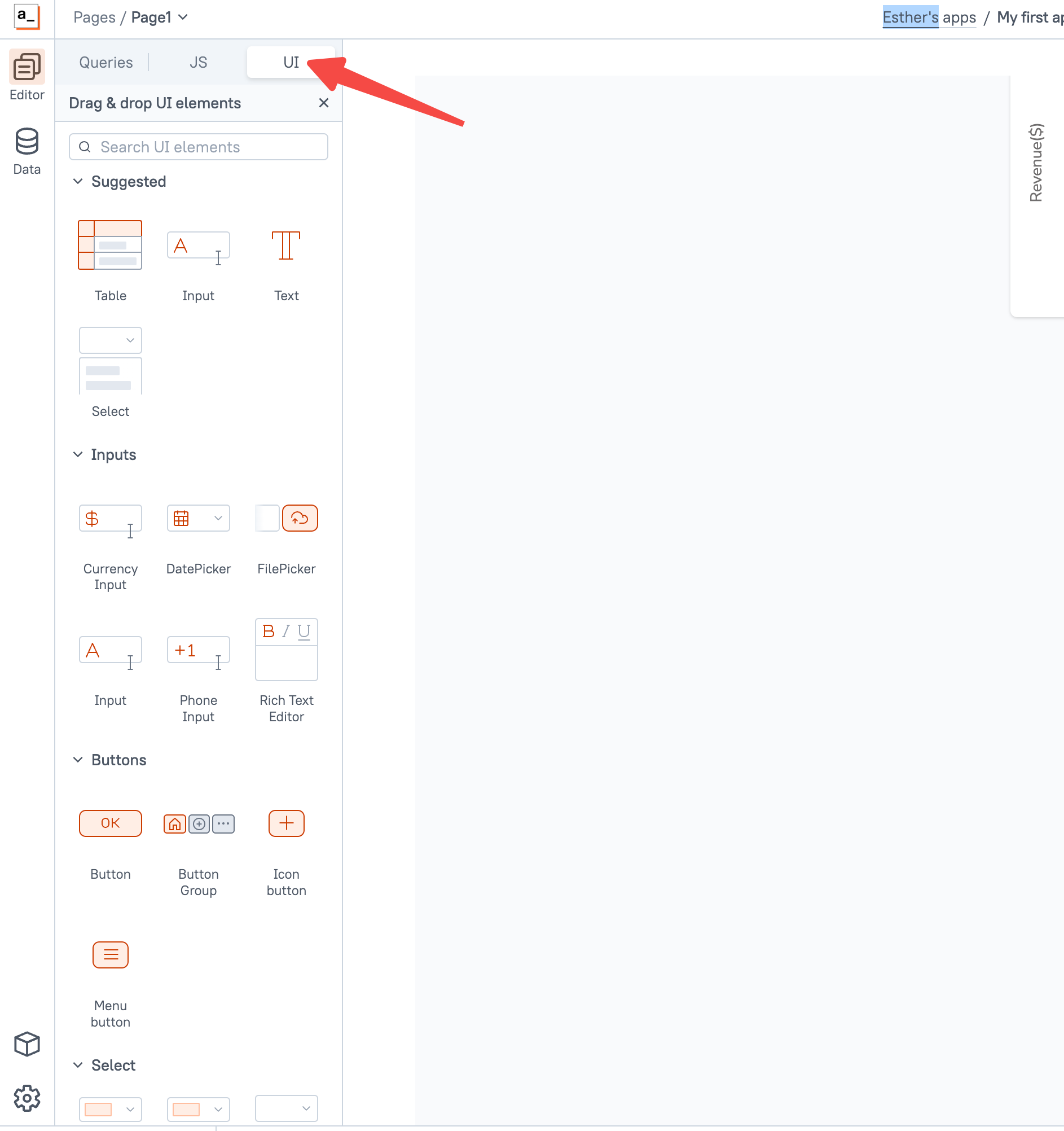
Comprehensive Component Library: The component library covers common UI elements, suitable for most data display and interaction needs. Developers can use these components without designing from scratch.
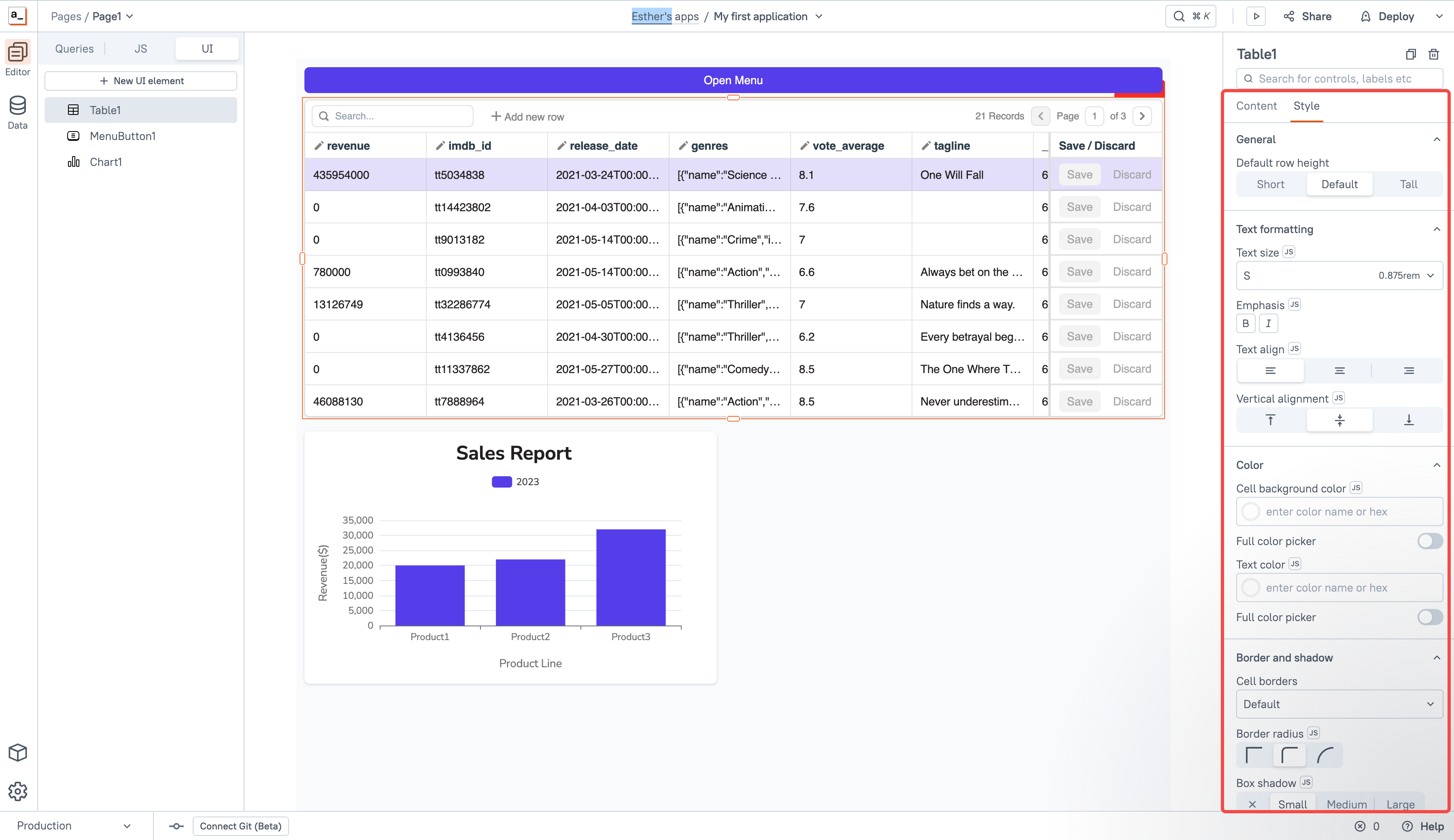
Basic Style Customization: Appsmith provides basic styling options, but its customizability is limited for highly personalized designs.
To summarize, NocoBase offers greater design flexibility, suitable for complex layouts and highly customized enterprise-level applications. Appsmith simplifies interface building with drag-and-drop design, making it ideal for rapid prototyping and standardized interfaces.
Integration Capabilities
Integration capabilities directly impact the scalability and flexibility of data processing within an application. Good integration options enable businesses to quickly connect to various data sources, enterprise applications, and cloud services without altering existing systems, ensuring seamless business processes.
💡 Dig deeper: Low Code/No Code Integration Capabilities
NocoBase offers a flexible plugin system, allowing developers to achieve custom integrations and functionality extensions through plugins.
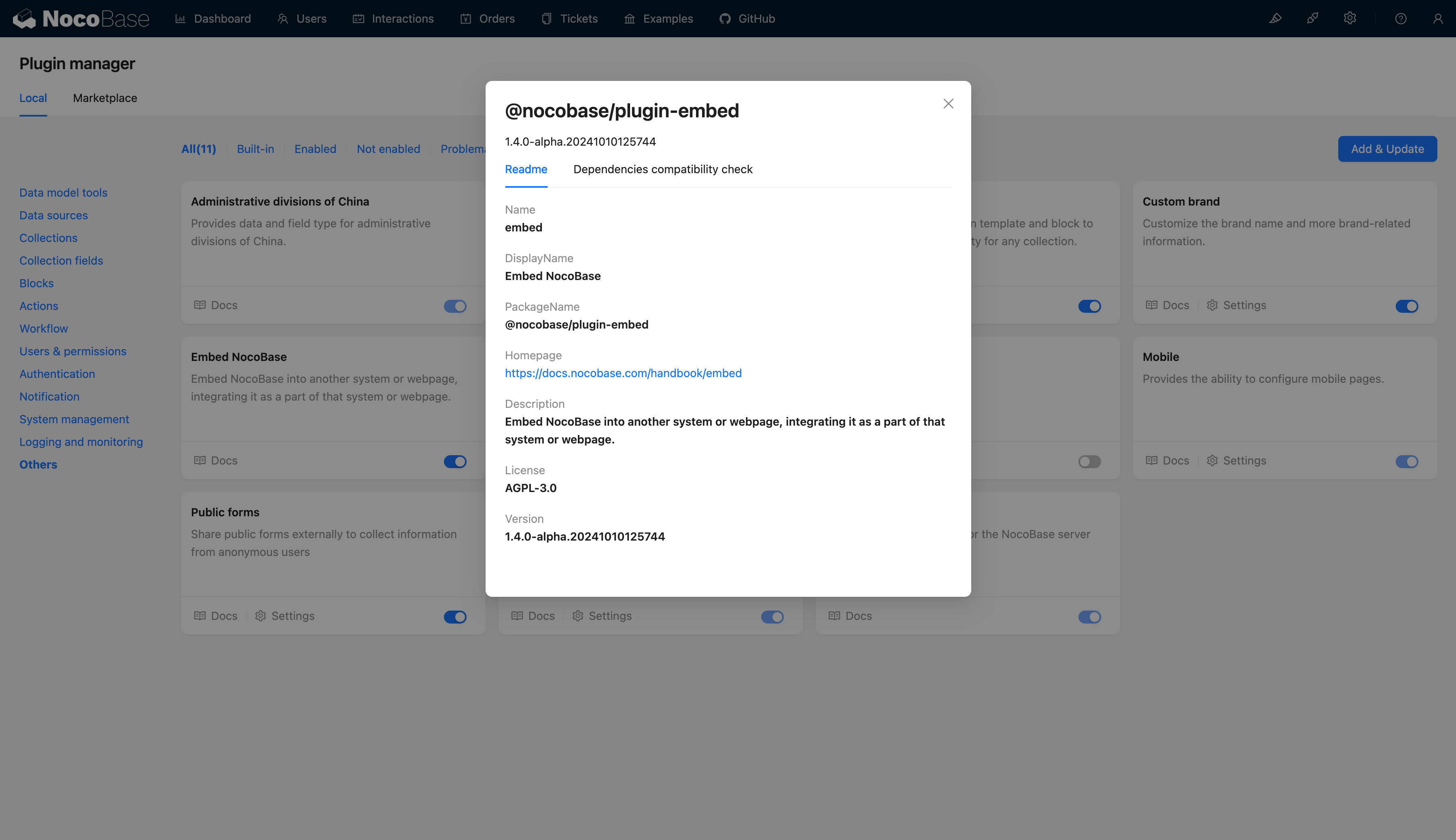
NocoBase has several ways to achieve integration with third-party systems:
- Third-Party Databases as Data Sources: NocoBase supports integrating external databases (such as MySQL, PostgreSQL) as data sources, enabling developers to access and manipulate external data directly within the platform.
- Third-Party API Integration: Developers can integrate APIs from other systems as data sources, configuring interfaces to fetch or push data, thus facilitating seamless data interactions with existing systems.
- Single Sign-On (SSO): NocoBase supports SSO, enabling integration with third-party authentication systems, allowing users to access multiple applications through a unified authentication system.
- Embedded Integration: NocoBase supports embedding third-party systems within its interface, enabling a tighter integration between systems.
- Multi-Application Integration: Different NocoBase applications can interact with each other, allowing for data exchange and collaboration across applications, suitable for building distributed application systems.
Appsmith provides various integration options and built-in data source connectors, supporting quick connections to common data sources and third-party services. Some advanced integration features require an enterprise edition, which incurs additional costs.
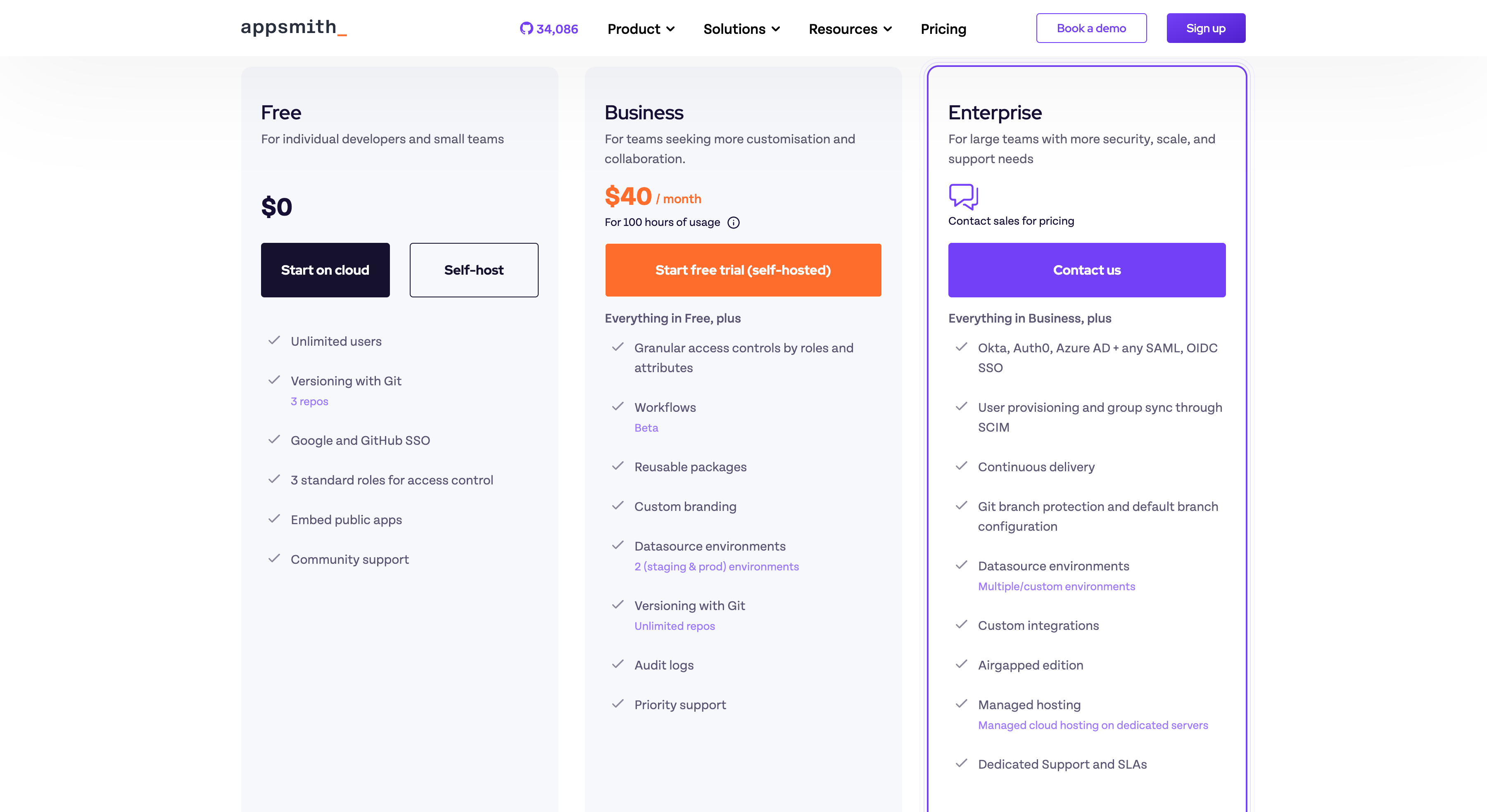
- Wide Data Source Support: Appsmith supports mainstream databases (MySQL, PostgreSQL, MongoDB, etc.), REST APIs, GraphQL, Airtable, and Google Sheets through built-in connectors, allowing developers to easily integrate external data sources with minimal configuration.
- Automated API Integration: The platform offers auto-generated API integration templates for quick setup with REST and GraphQL services.
- Advanced Integration (Enterprise Edition): Features such as private embeds, self-hosted environment integration, and enhanced security controls are available in the enterprise edition, ideal for projects requiring higher security or complex integration.
- Custom Authentication and SSO (Enterprise Edition): The enterprise edition also includes custom authentication methods and SSO, facilitating integration with existing enterprise identity management systems.
From the integration analysis above, NocoBase is more suitable for projects requiring custom integrations, complex data handling, and multi-step business processes. Appsmith is ideal for projects that need to integrate various data sources or APIs and quickly implement data-driven interfaces, such as dashboards and reporting tools.
Access Control
Access control is essential for enterprise applications, ensuring data security and compliance.
NocoBase provides fine-grained, multi-level access control for complex security needs:
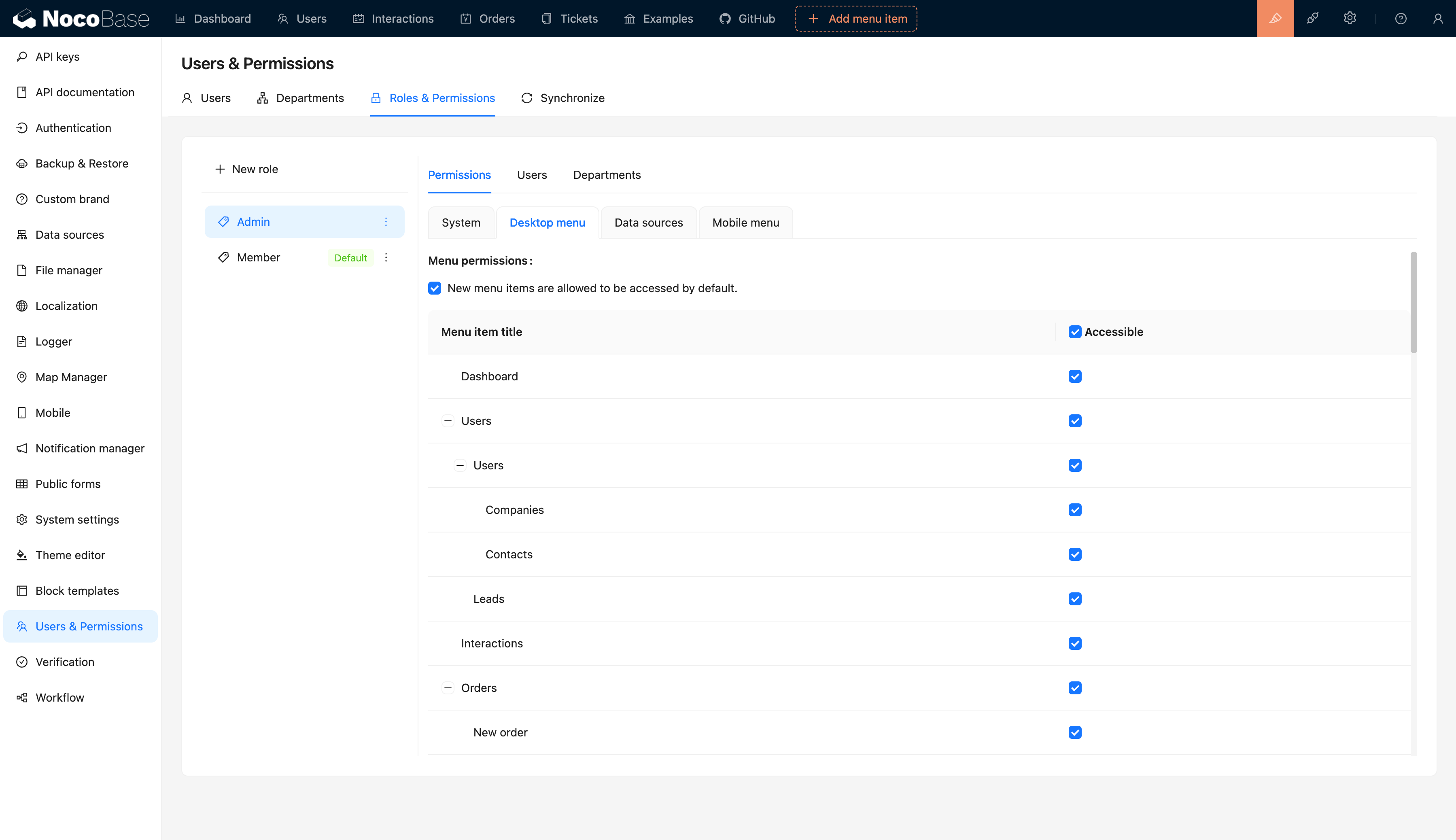
Multi-Level Permission Management: Supports permissions for tables, fields, and records. Developers can configure different data access permissions for various roles and user groups, ensuring precise data management. For instance, some user groups may only view certain fields or records, preventing unauthorized access.
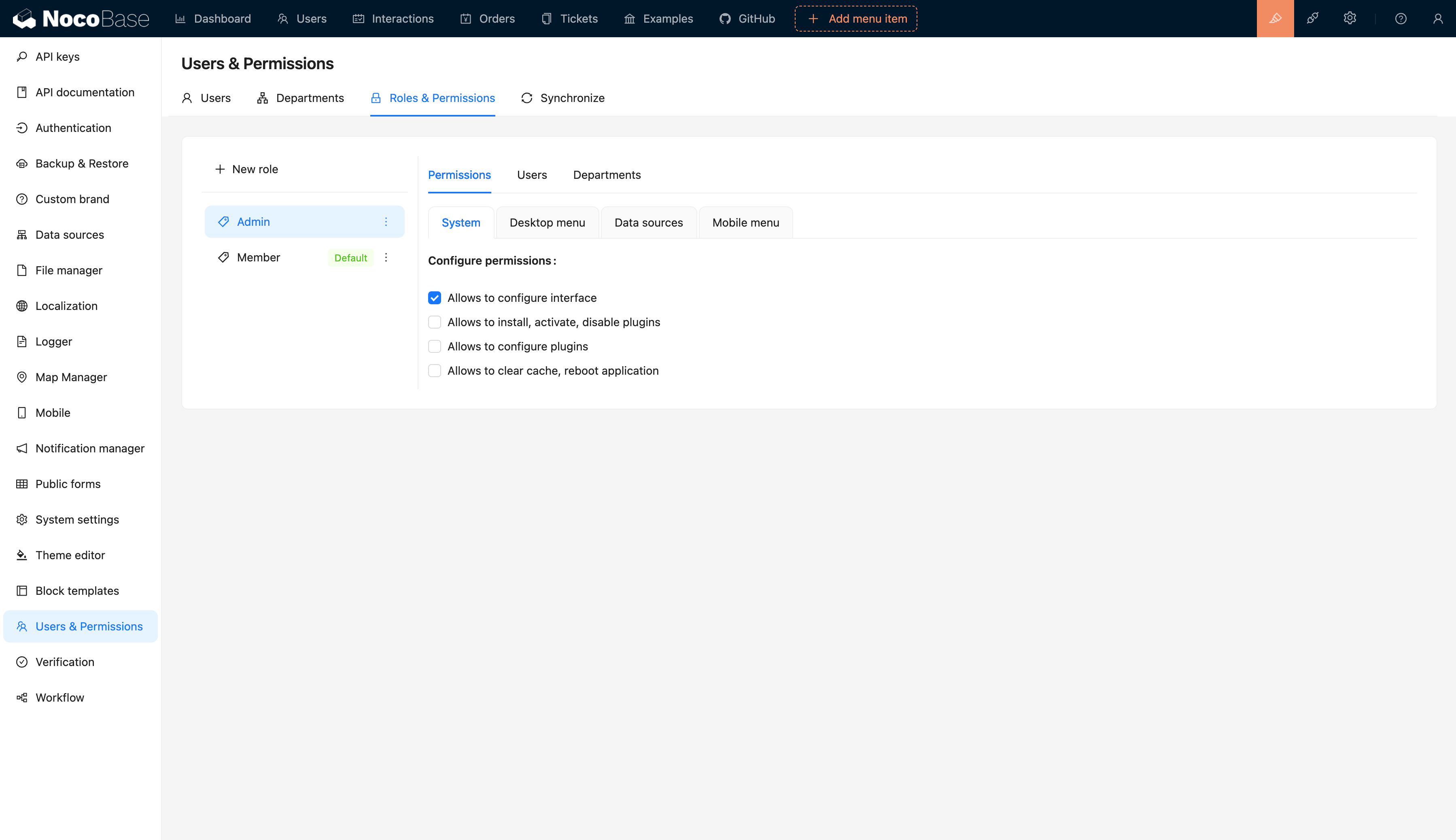
Roles and User Group Management: Allows developers to create custom roles and user groups with specific permissions, making the configuration flexible and adaptable to changing business requirements.
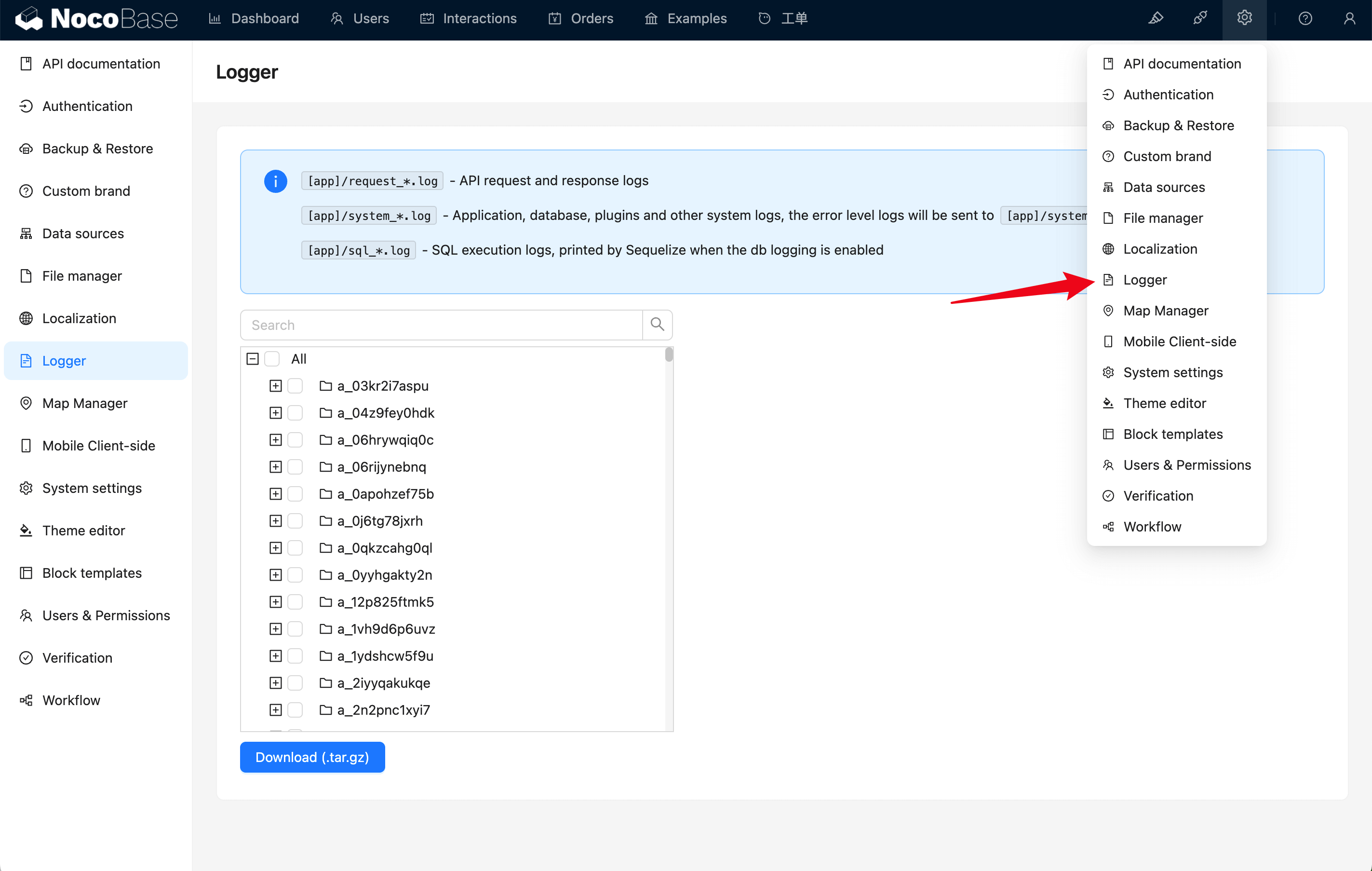
Data Access Auditing and Logging: NocoBase also logs user actions, enabling tracking for security audits and compliance checks.
Appsmith offers basic access control features, primarily focusing on application and page-level access:
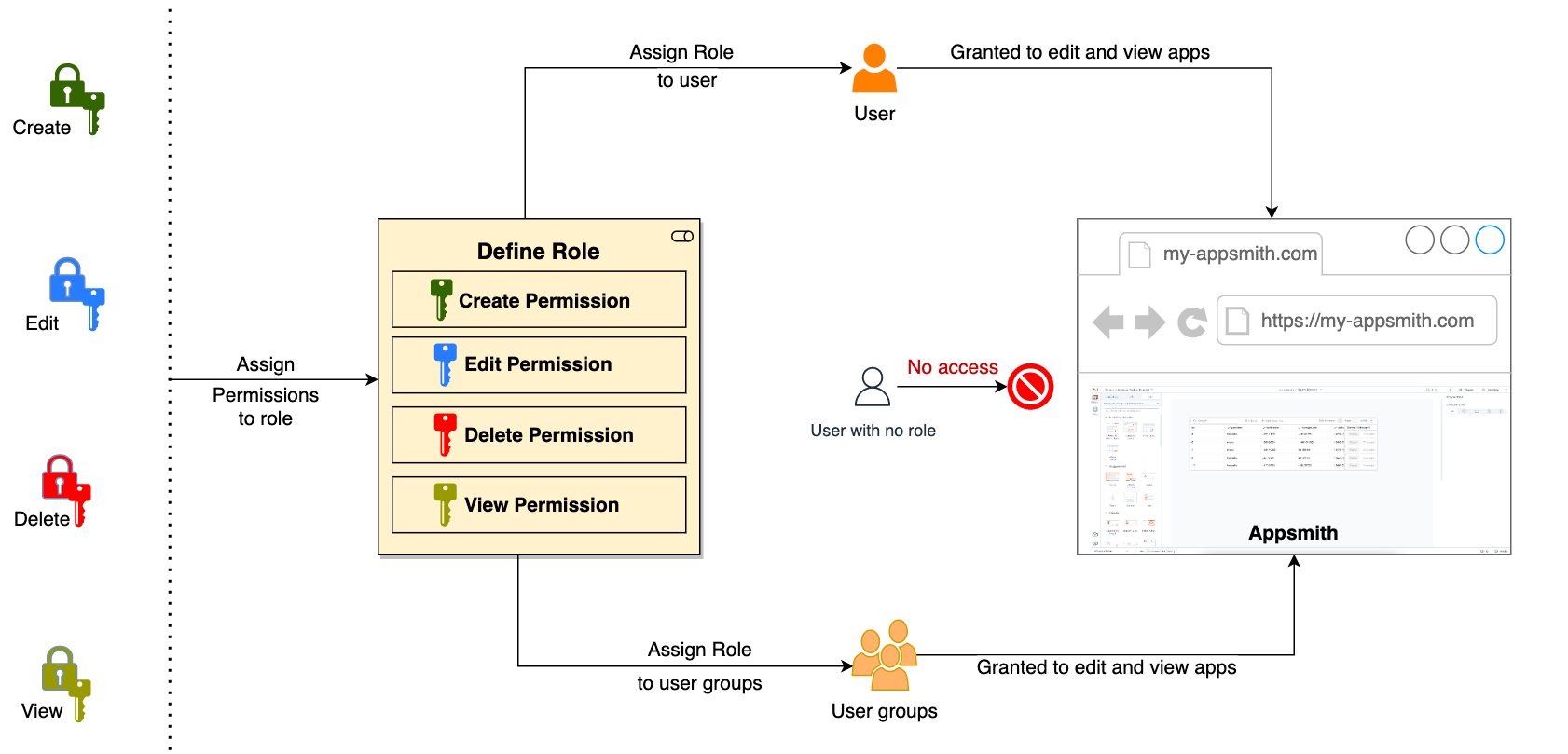
Page-Level Permission Settings: Allows developers to set access permissions for the entire application or specific pages, which can restrict access based on user roles. While suitable for basic access control needs, it lacks the detailed data-level control of NocoBase.
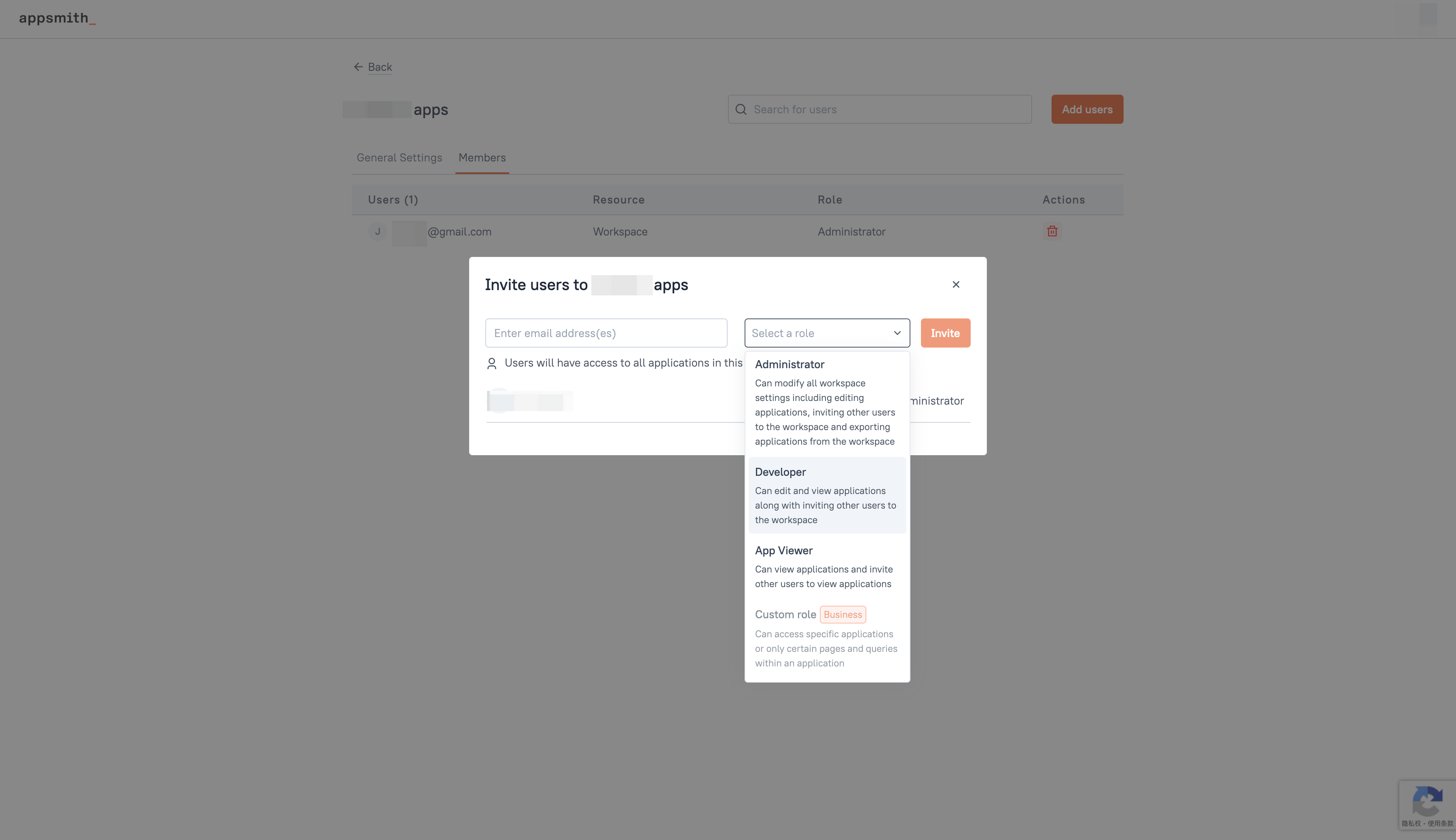
Role Management: Configurable role-based access control is available, but mainly for higher-level structures rather than fine-grained data control.
Enterprise Edition Extensions: Advanced features like SSO and dynamic permissions based on user attributes require the enterprise edition, potentially adding costs for businesses with strict access control requirements.
Workflow Automation
Workflow automation is crucial for enhancing business efficiency, especially when dealing with complex business processes, as it significantly reduces manual tasks and errors.
💡 Read More: 5 Best Tools for Building Workflow Automation
NocoBase provides robust workflows support for complex business process automation:
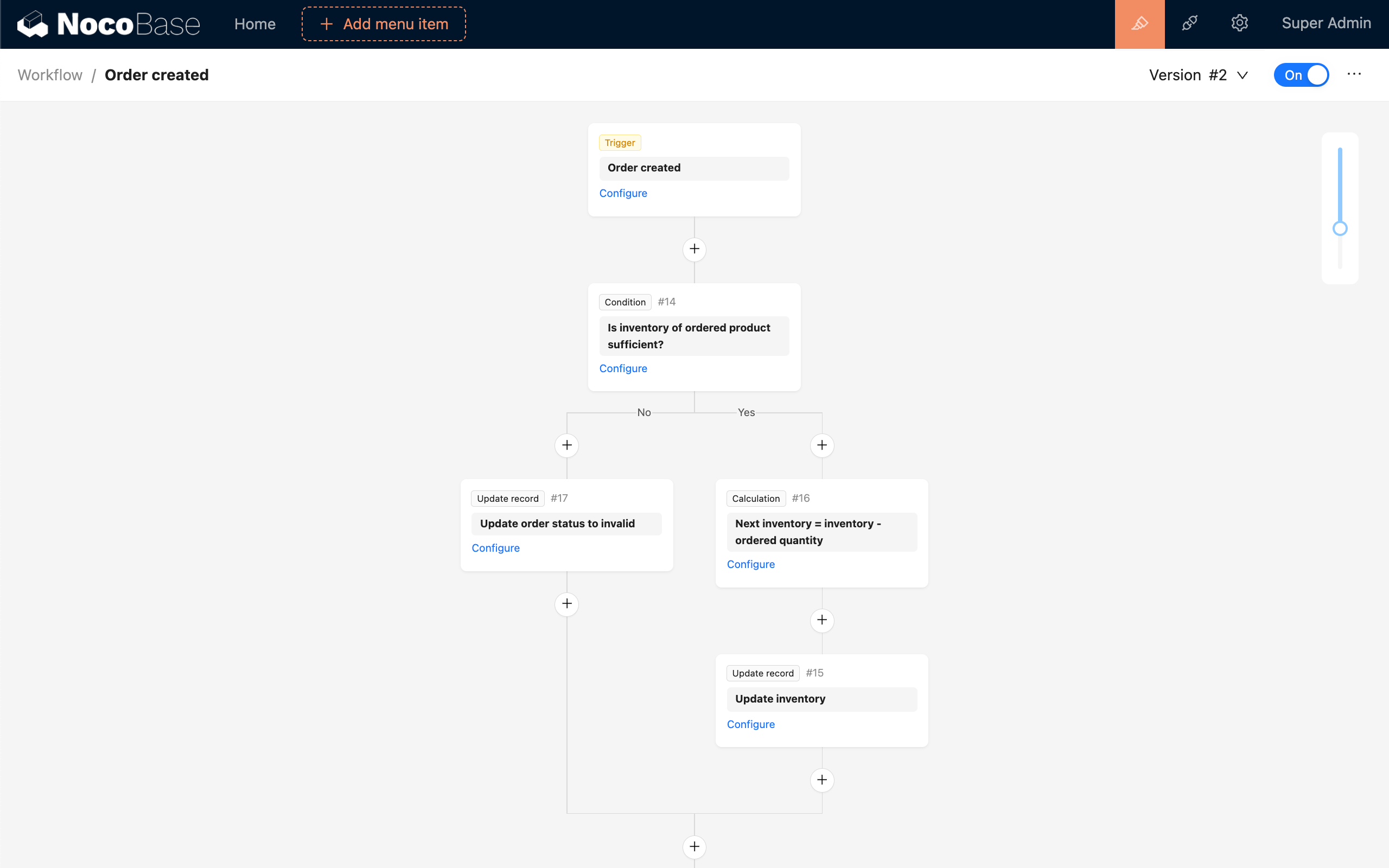
Visual Workflow Designer: Comes with a drag-and-drop workflow editor, allowing developers to configure workflow steps, including conditional logic, data manipulation, and notifications.
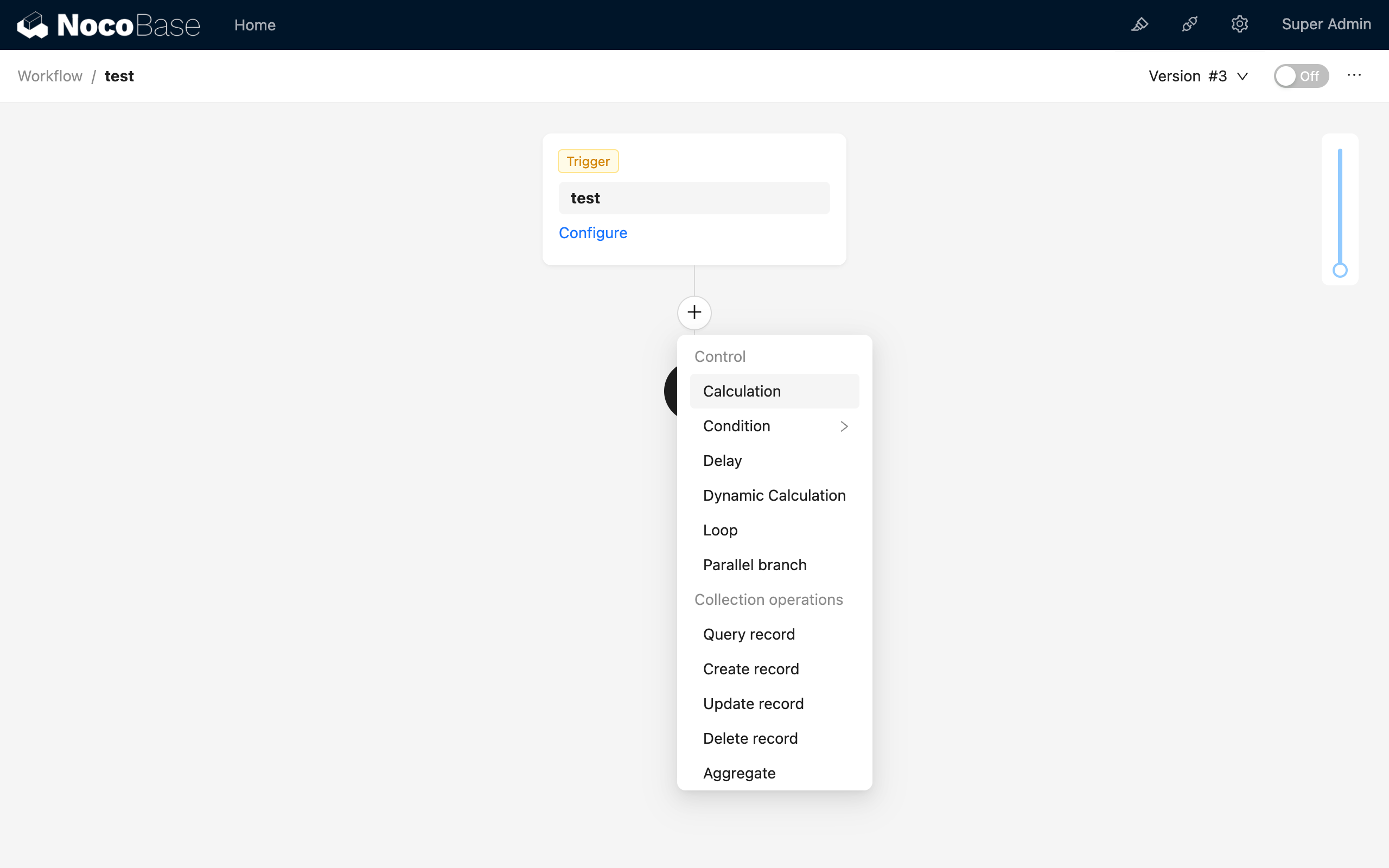
Diverse Node Types: Supports multiple node types, such as conditional nodes, API call nodes, and database operation nodes. Developers can choose the appropriate node type based on business needs, enabling flexible business process configurations.
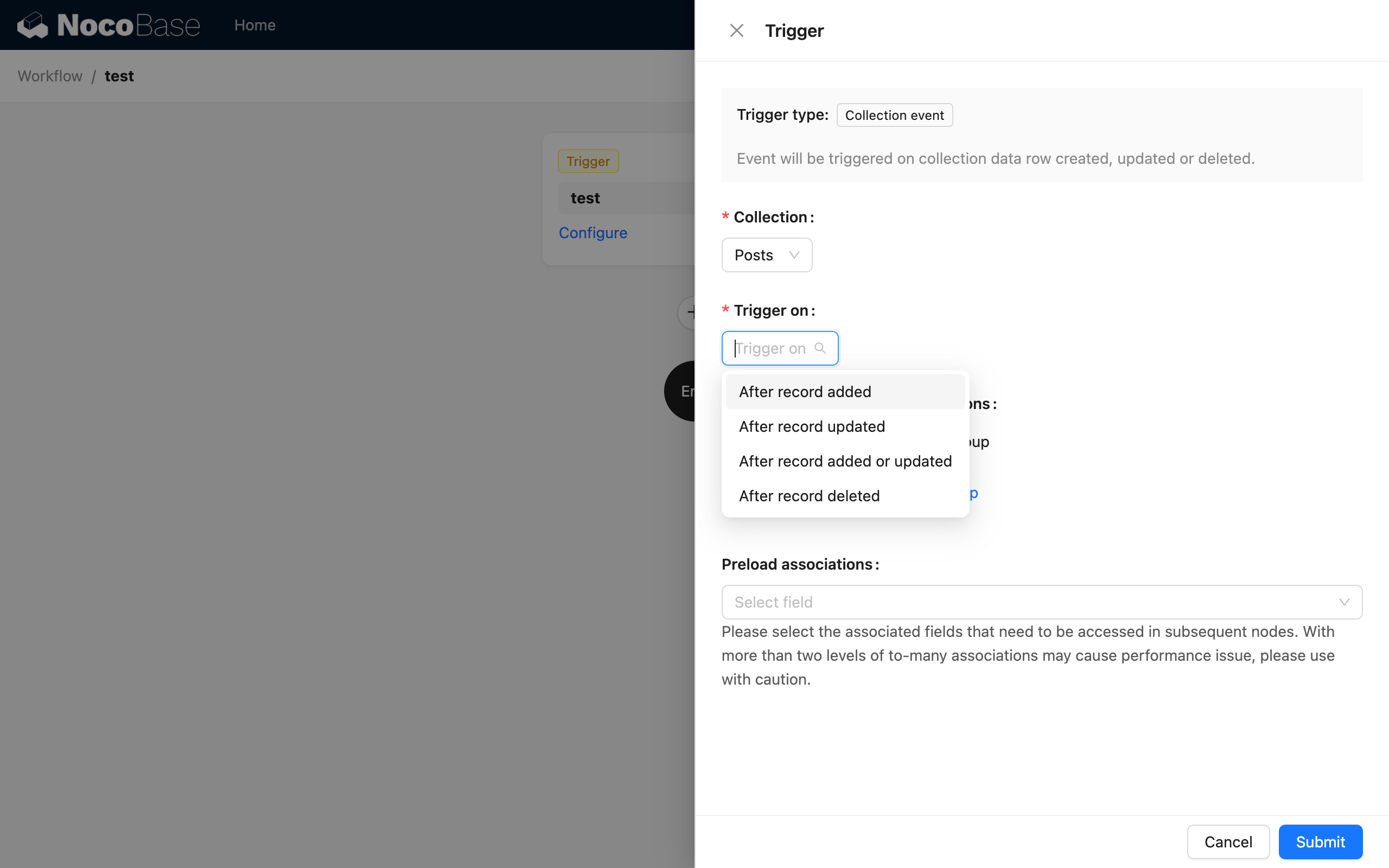
Event-Driven Automation: Supports event-based automation tasks, such as triggering workflows automatically when certain data conditions are met. This event-driven approach is suitable for scenarios requiring real-time responses.
Appsmith does not offer a native workflow system, but automation tasks can be partially achieved through scripts and integrations:
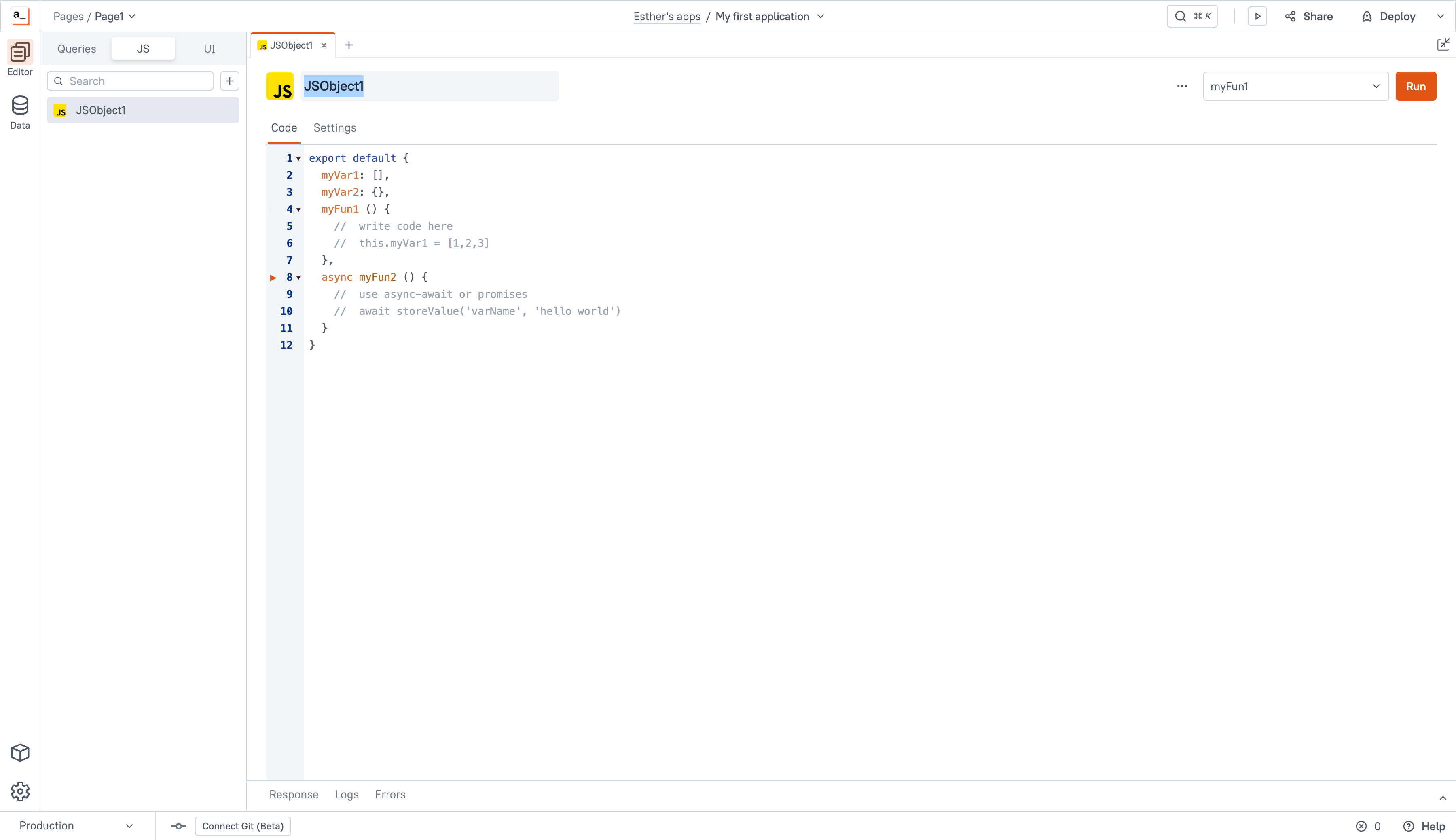
Script-Based Automation: Developers can use JavaScript to control data operations and page interactions in Appsmith. While this allows for some automation, it requires coding, making complex workflow configurations more challenging.
Integration with External Automation Tools: Appsmith supports integration with tools like Zapier or Integromat to extend automation capabilities, enabling tasks such as automatic data processing, notifications, and cross-system integrations.
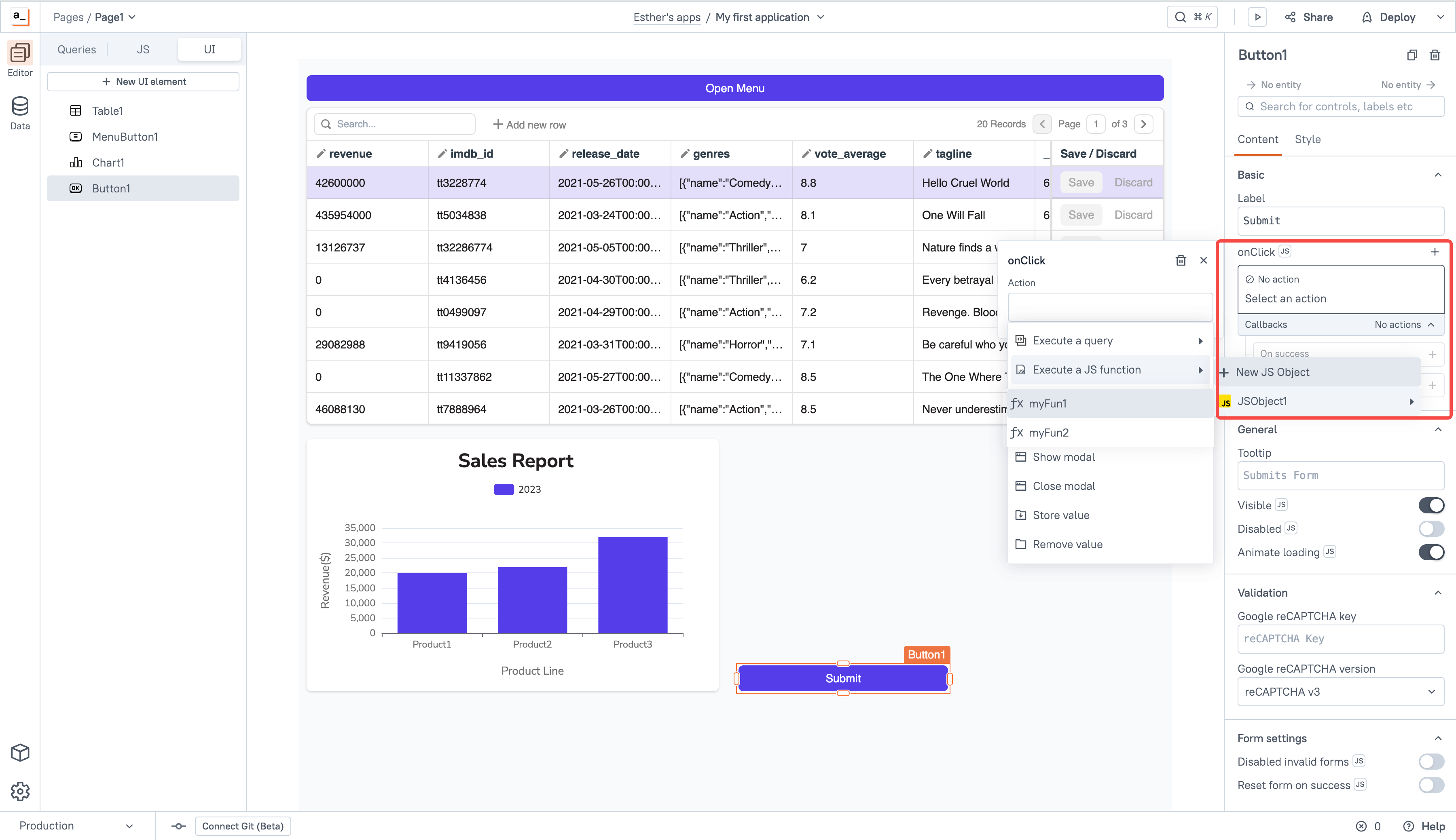
Event-Driven Page Interactions: Appsmith supports event-driven actions, such as updating data or calling APIs after form submission. This type of automation is suitable for simple tasks at the interface level but lacks support for complex business process management.
Comparatively, NocoBase’s visual workflow designer lowers the threshold for configuring complex processes, while Appsmith requires programming skills for more advanced automation.
Deployment Analysis
NocoBase Deployment Options
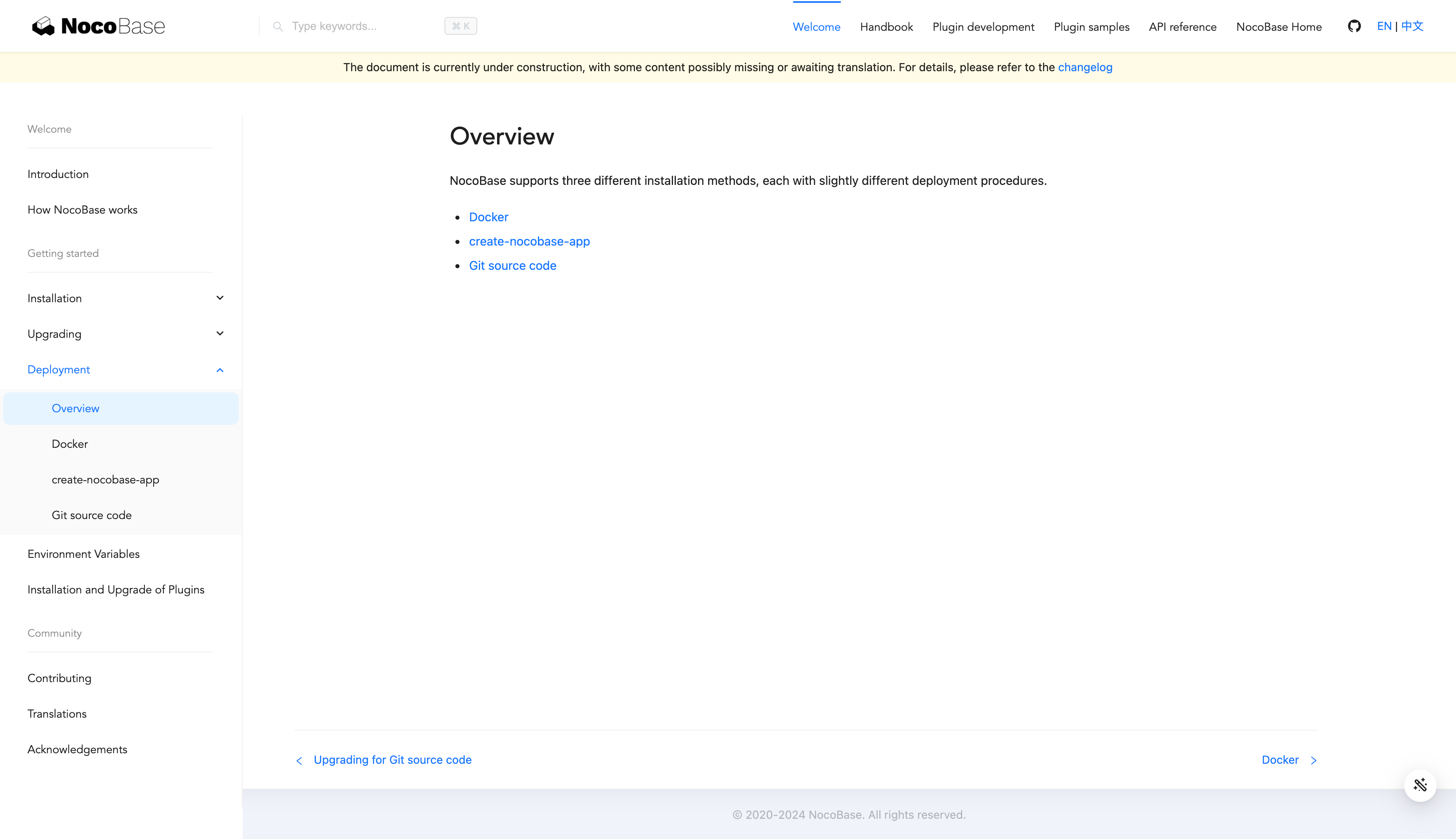
NocoBase supports three different installation methods, each with slightly different deployment procedures.
Deployment Steps (Docker):
- Install Docker and Docker Compose.
- Download NocoBase’s Docker Compose file.
- Run the
docker-compose up -dcommand. - Access
http://localhost:13000to complete the initialization.
System Requirements:
- Recommended 2-core CPU, 4GB RAM
- Supports Linux, macOS and Windows
Appsmith Deployment Options
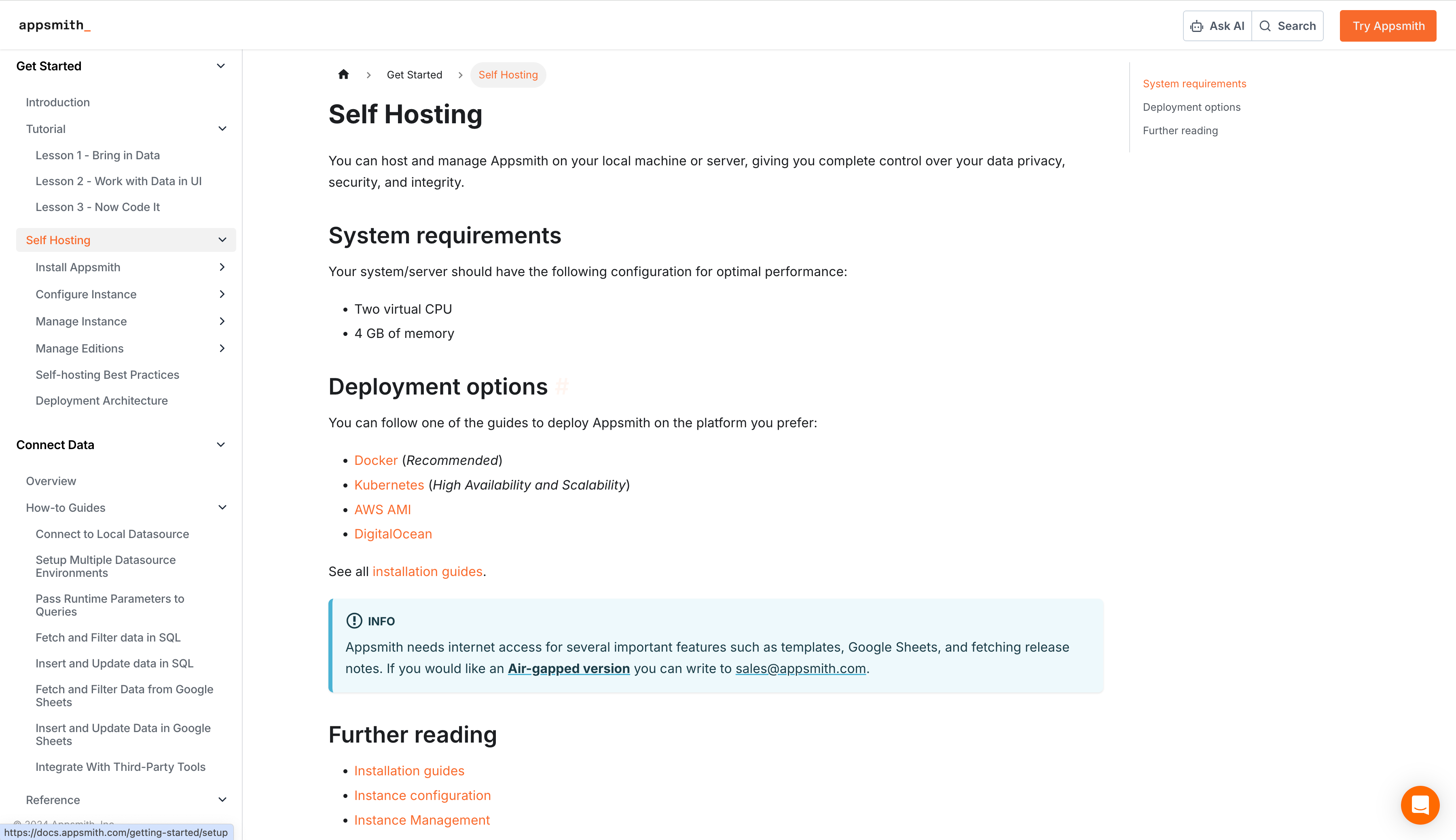
- Docker Deployment: Supports Docker Compose or single container options, suitable for most users.
- Kubernetes Deployment: Ideal for large-scale deployments.
- Build from Source Code: Allows for highly customized setups.
Deployment steps (Docker method):
- Install Docker
- Run the Appsmith container:
docker run -d --name appsmith -p 80:80 -v "$PWD/stacks:/appsmith-stacks" appsmith/appsmith-ce
- Visit http://localhost to set up
system requirements:
- Minimum 1-core CPU, 4GB RAM
- Recommended 2-core CPU, 8GB RAM
- Supports Linux, macOS and Window
Deployment Comparison
| Feature | NocoBase | Appsmith |
|---|---|---|
| Recommended Deployment | Docker | Docker |
| Deployment Difficulty | Relatively Simple | Moderate |
| Automatic Updates | Supported | Requires Manual Operation |
| Cloud Hosting Options | Not Officially Provided | Available |
| Enterprise Deployment | Supported | Supported |
| Documentation Completeness | Relatively Good | Very Detailed |
| Community Support | Active | Very Active |
Specific Use Case Recommendations
After the detailed analysis above, I’m sure you have a better understanding of the features of these two products. Let me briefly summarize their best use case!
NocoBase is suitable for projects requiring complex data management, highly customizable interfaces, strict access control, and workflow automation. It excels in:
- Enterprise Business Management Systems: Ideal for CRM, project management, and HR management systems that require complex data relationships, access control, and workflows.
- Custom Business Processes and Approval Systems: The visual workflow designer is perfect for building approval systems and order processing systems with complex business processes.
- Multi-System Integration Projects: Suitable for projects needing deep integration with existing systems, offering a flexible plugin architecture.
NocoBase Customer Case:
The TEDxDUTH Transformation with NocoBase
Sambruk Leverages NocoBase to Ensure Digital Learning Resources in Sweden Comply with GDPR
UUL Saves 70% on Logistics System Upgrade with NocoBase
Appsmith is ideal for quickly building dashboards, application interfaces, and integrating with common data sources. It works well in:
- Data Management Dashboards: The drag-and-drop design and built-in components make it ideal for dashboards, reporting systems, and admin panels.
- Lightweight Applications: Suitable for task management, customer support, and inventory management applications that don’t require complex permissions.
- Cross-Data Source Applications: Great for integrating multiple data sources, such as databases, REST APIs, and GraphQL.
Appsmith Customer Case:
SCHMALZ+SCHÖN Reduced Custom App Development Time by 70%
Fhynix Speeds Up Time to Market by 25% Using Appsmith
Conclusion
The choice of the right platform depends on the complexity of your project, data security requirements, integration needs, and deployment preferences. It’s recommended to explore and try out both NocoBase and Appsmith based on your specific needs to determine which tool is the best fit for your current project.
Whether you are aiming for enterprise-level applications with complex business logic or lightweight tools for quickly building data-driven interfaces, NocoBase and Appsmith each offer their own optimal solutions.
Thank you for reading! If you found this article helpful, feel free to share it with your friends! ❤️
Related reading:
- Top 13 Self-Hosted Projects with the Most GitHub Stars
- Top 8 Open-Source CRUD Projects with the Most GitHub Stars - NocoBase
- Top 11 Open Source Internal Tools with the Most GitHub Stars
- Top 15 Open-Source Low-Code Projects with the Most GitHub Stars
- The Top 12 Open-Source No-Code Tools with the Most GitHub Stars
- NocoBase vs NocoDB: An In-Depth Comparison of Open Source No-Code Tools